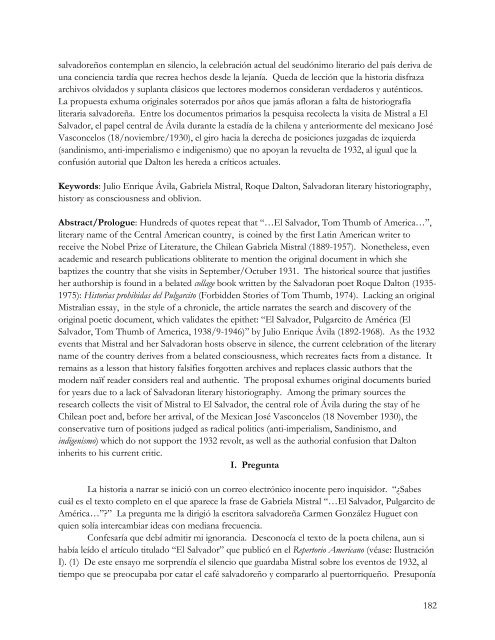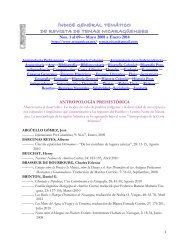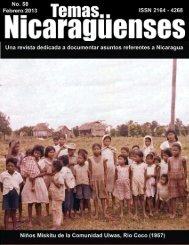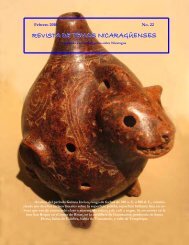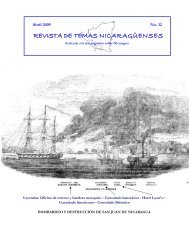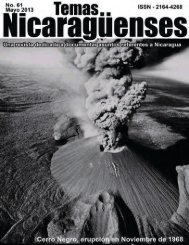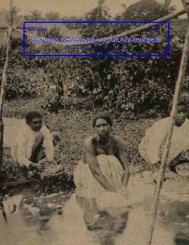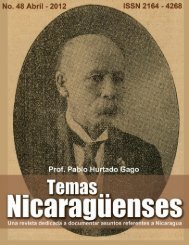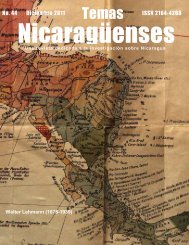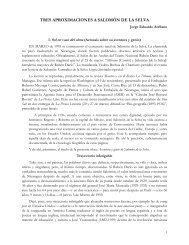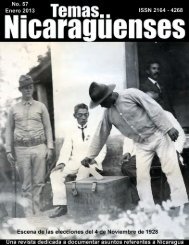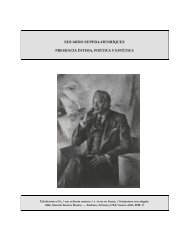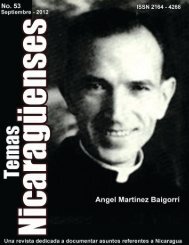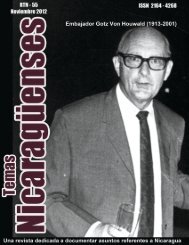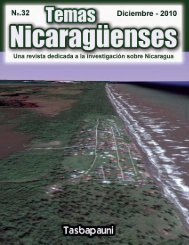21 - Revista de Temas Nicaragüenses
21 - Revista de Temas Nicaragüenses
21 - Revista de Temas Nicaragüenses
Create successful ePaper yourself
Turn your PDF publications into a flip-book with our unique Google optimized e-Paper software.
salvadoreños contemplan en silencio, la celebración actual <strong>de</strong>l seudónimo literario <strong>de</strong>l país <strong>de</strong>riva <strong>de</strong><br />
una conciencia tardía que recrea hechos <strong>de</strong>s<strong>de</strong> la lejanía. Queda <strong>de</strong> lección que la historia disfraza<br />
archivos olvidados y suplanta clásicos que lectores mo<strong>de</strong>rnos consi<strong>de</strong>ran verda<strong>de</strong>ros y auténticos.<br />
La propuesta exhuma originales soterrados por años que jamás afloran a falta <strong>de</strong> historiografía<br />
literaria salvadoreña. Entre los documentos primarios la pesquisa recolecta la visita <strong>de</strong> Mistral a El<br />
Salvador, el papel central <strong>de</strong> Ávila durante la estadía <strong>de</strong> la chilena y anteriormente <strong>de</strong>l mexicano José<br />
Vasconcelos (18/noviembre/1930), el giro hacia la <strong>de</strong>recha <strong>de</strong> posiciones juzgadas <strong>de</strong> izquierda<br />
(sandinismo, anti-imperialismo e indigenismo) que no apoyan la revuelta <strong>de</strong> 1932, al igual que la<br />
confusión autorial que Dalton les hereda a críticos actuales.<br />
Keywords: Julio Enrique Ávila, Gabriela Mistral, Roque Dalton, Salvadoran literary historiography,<br />
history as consciousness and oblivion.<br />
Abstract/Prologue: Hundreds of quotes repeat that “…El Salvador, Tom Thumb of America…”,<br />
literary name of the Central American country, is coined by the first Latin American writer to<br />
receive the Nobel Prize of Literature, the Chilean Gabriela Mistral (1889-1957). Nonetheless, even<br />
aca<strong>de</strong>mic and research publications obliterate to mention the original document in which she<br />
baptizes the country that she visits in September/Octuber 1931. The historical source that justifies<br />
her authorship is found in a belated collage book written by the Salvadoran poet Roque Dalton (1935-<br />
1975): Historias prohibidas <strong>de</strong>l Pulgarcito (Forbid<strong>de</strong>n Stories of Tom Thumb, 1974). Lacking an original<br />
Mistralian essay, in the style of a chronicle, the article narrates the search and discovery of the<br />
original poetic document, which validates the epithet: “El Salvador, Pulgarcito <strong>de</strong> América (El<br />
Salvador, Tom Thumb of America, 1938/9-1946)” by Julio Enrique Ávila (1892-1968). As the 1932<br />
events that Mistral and her Salvadoran hosts observe in silence, the current celebration of the literary<br />
name of the country <strong>de</strong>rives from a belated consciousness, which recreates facts from a distance. It<br />
remains as a lesson that history falsifies forgotten archives and replaces classic authors that the<br />
mo<strong>de</strong>rn naïf rea<strong>de</strong>r consi<strong>de</strong>rs real and authentic. The proposal exhumes original documents buried<br />
for years due to a lack of Salvadoran literary historiography. Among the primary sources the<br />
research collects the visit of Mistral to El Salvador, the central role of Ávila during the stay of he<br />
Chilean poet and, before her arrival, of the Mexican José Vasconcelos (18 November 1930), the<br />
conservative turn of positions judged as radical politics (anti-imperialism, Sandinismo, and<br />
indigenismo) which do not support the 1932 revolt, as well as the authorial confusion that Dalton<br />
inherits to his current critic.<br />
I. Pregunta<br />
La historia a narrar se inició con un correo electrónico inocente pero inquisidor. “¿Sabes<br />
cuál es el texto completo en el que aparece la frase <strong>de</strong> Gabriela Mistral “…El Salvador, Pulgarcito <strong>de</strong><br />
América…”?” La pregunta me la dirigió la escritora salvadoreña Carmen González Huguet con<br />
quien solía intercambiar i<strong>de</strong>as con mediana frecuencia.<br />
Confesaría que <strong>de</strong>bí admitir mi ignorancia. Desconocía el texto <strong>de</strong> la poeta chilena, aun si<br />
había leído el artículo titulado “El Salvador” que publicó en el Repertorio Americano (véase: Ilustración<br />
I). (1) De este ensayo me sorprendía el silencio que guardaba Mistral sobre los eventos <strong>de</strong> 1932, al<br />
tiempo que se preocupaba por catar el café salvadoreño y compararlo al puertorriqueño. Presuponía<br />
182


